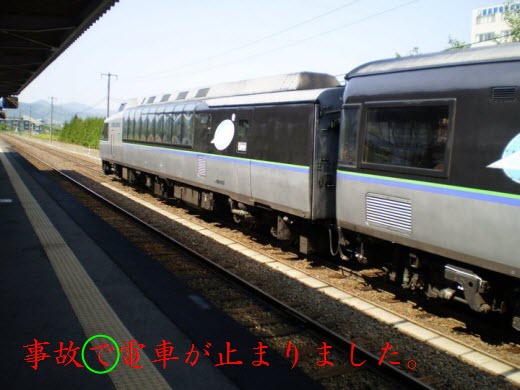- Home
- Intermediate Lessons
- Japanese Particle de Cause Reason
Japanese Particle de (で) for
Cause or Reason -
Intermediate Lessons: 34
In this lesson, I am going to introduce another function of Japanese particle de (で).
You know that most Japanese particles have multiple functions. Depending on situations, the same particle can represent different meanings in a sentence.
To recall what you have learned in the previous lessons about the particle de (で), check out basic lesson 16 and intermediate lesson 18.
Japanese particle de (で) sometimes indicates a cause or a reason. But there's a regulation that you need to take note of.
Sentence Pattern
Let's see what's the sentence pattern like...
| Noun | で | Result |
| (Casue/Reason) |
The "Noun" that is often used with this particle de (で) as a cause is a noun which indicates a particular kind of event, such as:
- 事故 (jiko - accident)
- 火事 (kaji - fire)
- 大雨 (ooame - heavy rain)
- 大雪 (ooyuki - heavy snow)
- 地震 (jishin - earthquake)
- 津波 (tsunami - tidal wave)
- 病気 (byouki - sickness)
- 仕事 (shigoto - work)
- etc.
As you can see, these events are mostly natural phenomena, disasters, happenings, events, etc.
Examples
Let's use some examples to show how to use this function of Japanese particle de (で)...

|
1. |
事故 で 電車が止まりました。 |
|
2. |
台風 で 家が壊れました。 |
|
3. |
大雨 で 木が倒れました。 |
|
4. |
地震 で 屋根が崩れました。 |
|
5. |
火事 で 怪我をしました。 |
|
6. |
病気 で 会社へ行けませんでした。 |
Regulation for using Japanese Particle de (で) as a Cause/Reason
You cannot have expression containing speaker's volitional action in the Result sentence. Therefore this particle is used in the following way:
→ Due to a cause/reason, an uncontrollable event happened.
Let's use some examples to show what it means in the regulation...
|
1. |
病気 で 学校を休むつもりです。 X |
|
2. |
病気 で 学校を休みたいです。 X |
|
3. |
病気 で 学校を休みました。 O |
Based on the regulation, only example 3 is correct because the other two examples show the speaker's volitional actions in the Result sentences.
In example 1, you are thinking of being absent from school. You have a choice of going or not going to school.
But you are thinking of not going to school because of your illness. This is a volitional action and thus failed to meet the regulation.
In example 2, you want to be absent from school. It's your desire since たい-form is being used. As this's also a volitional action, it failed to meet the regulation.
For example 3, the Result sentence 学校を休みました (gakkou wo yasumimashita) can be a volitional action by itself.
However, because it's used together with the particle de (で) in the sentence, it's no more a volitional action. You couldn't go to school due to your illness and you have no choice but to stay at home.
For example 2 and 3, you have to use から (kara) or ので (node) to make the sentences correct.
|
1. |
病気だ から 学校を休むつもりです。 O |
|
2. |
病気な ので 学校を休みたいです。 O |
Summary
Therefore, for Noun で Result, the Result has to be:
|
1. |
an uncontrollable event or result. |
|
2. |
an action which you are obliged to do. Volitional actions like つもりです (tsumori desu), intention or desire cannot be used here. |
Practice on using Japanese Particle de (で) as a Cause/Reason
Let's do some practice to check if you understand when to use Japanese particle de (で) as a cause/reason correctly.
Connect the two sentences in the following examples. The first sentence is the reason and the second sentence is the result.
Use the particle de (で) if you think it can be used. Use から (kara) if you think otherwise.
|
1. |
来週は夏休みです。日本へ遊びに行きます。 |
|
2. |
台風です。外へ出られません。 |
|
3. |
病気です。学校を休もうと思います。 |
|
4. |
病気です。病院へ行きました。 |
|
5. |
いい天気です。散歩をします。 |
Answers
|
1. |
来週は夏休みだ から、日本へ遊びに行きます。 |
|
2. |
台風 で 外へ出られません。 |
|
3. |
病気だ から、学校を休もうと思います。 |
|
4. |
病気 で 病院へ行きました。 |
|
5. |
いい天気だ から、散歩をします。 |
How well have you done? Have you got all your answers right?
Related Pages
Basic Lesson 16: Particles to (と) and de (で).
Lesson 18: Particle de (で) with more Functions.
Lesson 20: Japanese Grammar for Cause and Reason.
FAQ Page: How to use から (kara) in Japanese for reason.
Best Deal of the Year! Get 68% OFF Lifetime Premium! Ends on 13 Dec 2025
Click Here to Get 68% OFF Lifetime Premium and be on the fast track to fluency in Japanese.
The link above is an affiliate link, which means that I would earn a commission (at no extra cost to you) if you do end up purchasing the related learning course.
Buy me a coffee









Facebook Comments
Don’t see the comments box? Log in to your Facebook account, give Facebook consent, then return to this page and refresh it.